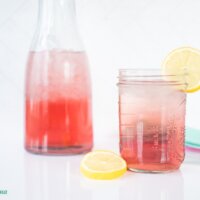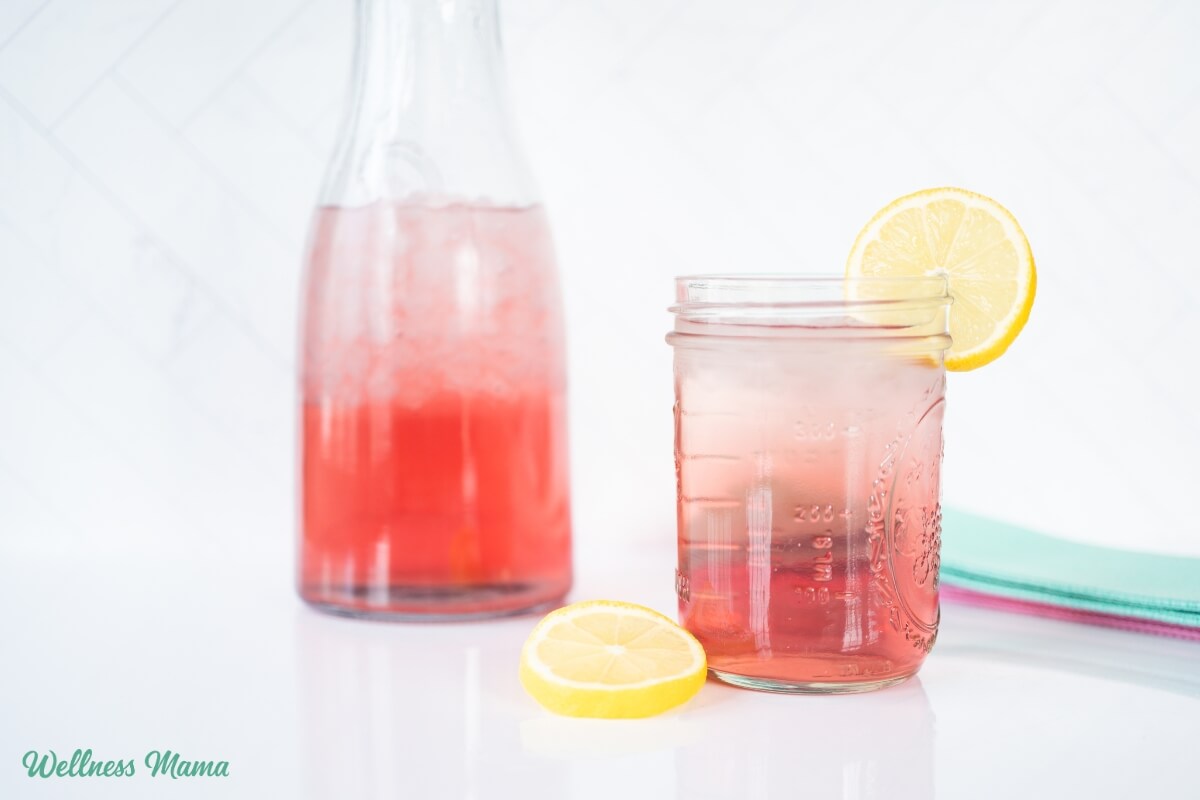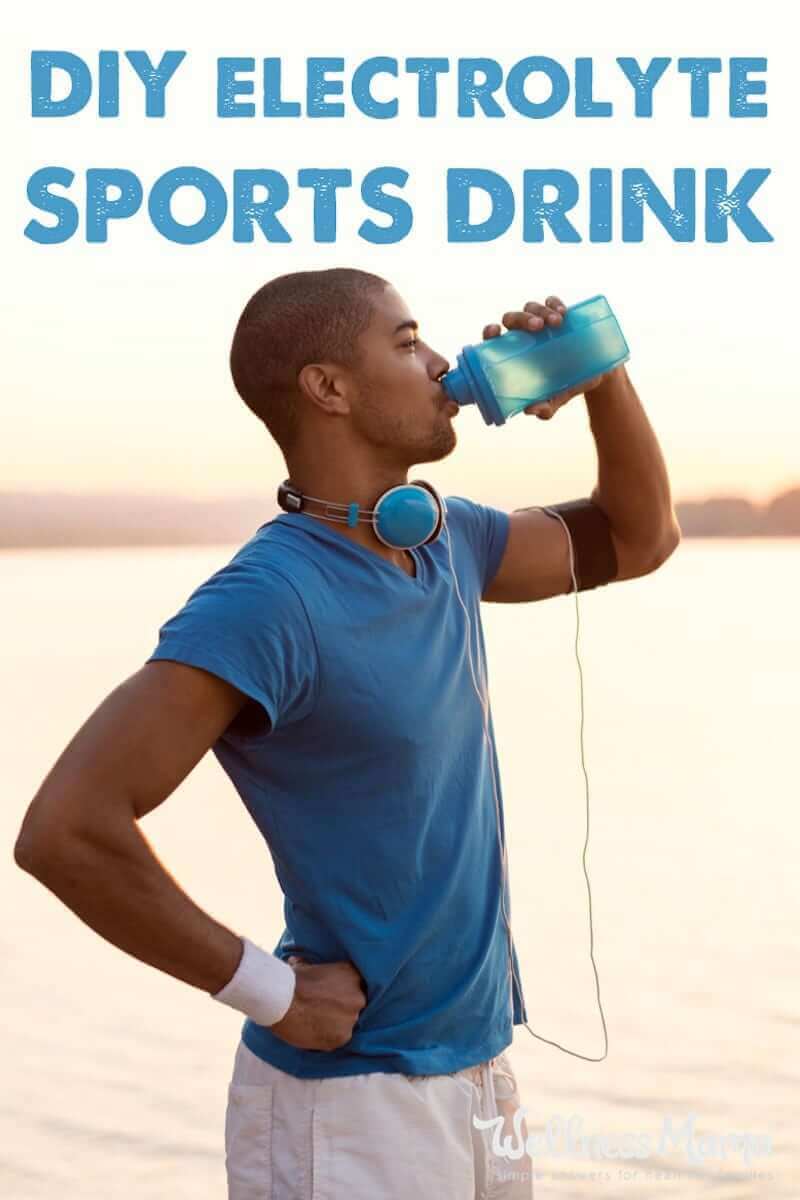Drinking enough pure clean water is one of the most important things we can do for overall health. In most cases, water alone is wonderful. When there’s hot weather or we’re exercising and sweating though we lose minerals through our sweat. A homemade electrolyte drink can help replenish minerals and remedy electrolyte imbalances.
Do We Really Need Electrolytes?
You may have heard that our bodies are 80% water, but they’re actually 80% salt water.
Plain water doesn’t have high levels of electrolytes. And our body loses a lot of minerals during exercise and hot weather. Adding electrolytes and minerals helps with rehydration after times of high-intensity exercise or lots of sweating. They’re also useful during times of illness if someone has vomiting or diarrhea to maintain fluid balance.
We need electrolytes to maintain healthy blood pressure, for our nervous system, and to prevent muscle cramps. They help move waste through the body and are overall necessary for every function! In a perfect world, we wouldn’t need supplements but electrolyte water and drinks can be very helpful for some.
My Cautionary Tale
This post could also be titled “How to avoid a big hospital charge for IV fluids while on vacation.” Hopefully, you can learn from my mistake on this one.
Years ago I went on vacation and spent days on the beach snorkeling, sailing, and scuba diving.
Normally, if I’m out in the sun I have my own homemade electrolyte drink with me, but this time I’d forgotten some of the ingredients. I figured I would just drink enough water, which worked fine until I had wine for dinner that night, coffee the next morning, and not enough water.
At that point, I noticed I was getting a headache. I started drinking water but the headache got worse and I also started having a rapid pulse, dizziness, and nausea. Even after drinking lots of water I still had dehydration and heat exhaustion symptoms.
This resulted in a trip to the international hospital to get fluids. After the most painful IV of my life with a 12-gauge needle, the fluids were in and I started to feel better!
After several hours of sitting in a hospital getting hydrated with IVs, I couldn’t help but think how much easier, cheaper, and less painful things would have been if I’d remembered my DIY electrolyte drink.
Why Not Regular Sports Electrolyte Drinks?
So why not just drink one of the many store-bought electrolyte drinks available (Gatorade, Powerade, etc.) these days?
Regular sports drinks contain lots of glucose, artificial flavors and colors, and not much nourishment.
I’m all for rehydrating, but are the preservatives, mystery flavors, and artificial dyes really necessary? I know from experience that these ingredients typically make me feel terrible and just aren’t worth it. Now when I need something more than water to hydrate I make my own version.
Natural Sports Electrolyte Drink Recipe
Coconut water is one of the simplest sports drink alternatives and can be used as is. It’s similar in structure to the fluid used in IV rehydration. For this reason, there are rumors it was used during the Pacific War as an IV electrolyte replacement. It makes a pretty good natural electrolyte drink on its own or with a splash of lime juice.
Coconut water is a great source of potassium and sodium and I even used it during labor. The only downside to coconut water is the price. If you want an inexpensive (yet still healthy and tasty) alternative, this recipe is the next best thing.
Homemade Electrolyte Drink Recipe
You can make this recipe in a variety of ways, but the ratios are the most important part. The base is any healthy liquid of choice and some good options are:
- Herbal teas
- Coconut water
- Plain water
- Some people like these Bai drinks as a base as well (they do have erythritol for those who are sensitive to sugar alcohols)
To turn the basic liquid into a sports drink, add some or all of these ingredients:
- Salt – A high-quality salt adds sodium and other essential minerals. Table salt is pure sodium chloride and doesn’t have trace minerals, but Himalayan or sea salt are great options.
- Calcium and Magnesium – Adding calcium magnesium powder helps replenish minerals.
- Juice – Optional but adds sweetness and natural sugars if needed during exertion. Orange juice, lime juice, and fresh lemon juice are some of our favorites and add vitamin C and potassium.
- Natural Flavors – Add natural flavors like fresh ginger, fresh herbs, or even natural-flavored stevia extracts
This recipe is naturally gluten-free and can easily be made low-carb by omitting the added juice.
Want to Buy it?
Looking for a quick way to have electrolytes on hand, especially during travel? These are my favorite no-junk electrolyte powder drinks.
- LMNT – I’m a big fan of these flavored electrolyte powder that replaces vital electrolytes lost from sweating. They work amazingly on their own with just water and have different flavors like citrus, grapefruit, or watermelon.
- Jigsaw Health Electrolyte Supreme – My favorite flavor is the Berry-licious.

Homemade Electrolyte Drink Recipe
Servings
Ingredients
- 1 quart liquid (green tea, herbal tea, coconut water, or plain water)
- ⅛ -1/4 tsp Himalayan salt (or sea salt)
- 1 tsp calcium magnesium powder
- ¼ cup juice (optional)
- 1-2 TBSP raw honey or maple syrup (or stevia to taste)
Instructions
- Brew tea if using, or slightly warm base liquid.
- Add sea salt and calcium magnesium powder and mix.
- Add juice and sweetener if using and mix or shake well. A mason jar works well for this.
- Cool and store in the refrigerator until ready to use.
- This will last up to four days in the refrigerator, but I prefer to make it as needed.
Nutrition
Notes
- My normal recipe includes 1 quart of tea (brewed with red raspberry leaf, alfalfa, nettle, and stevia), ¼ tsp sea salt, 1 tsp calcium magnesium powder, and ¼ cup grape or apple juice.
- Another easy alternative is mixing vitamin C powder with water, salt, and a little juice.
- The magnesium in this recipe is 27 mg per serving. Nutrition data was calculated using raw honey, coconut water, and grape juice. The exact nutrients will depend on which ingredients you use.





Leave a Reply